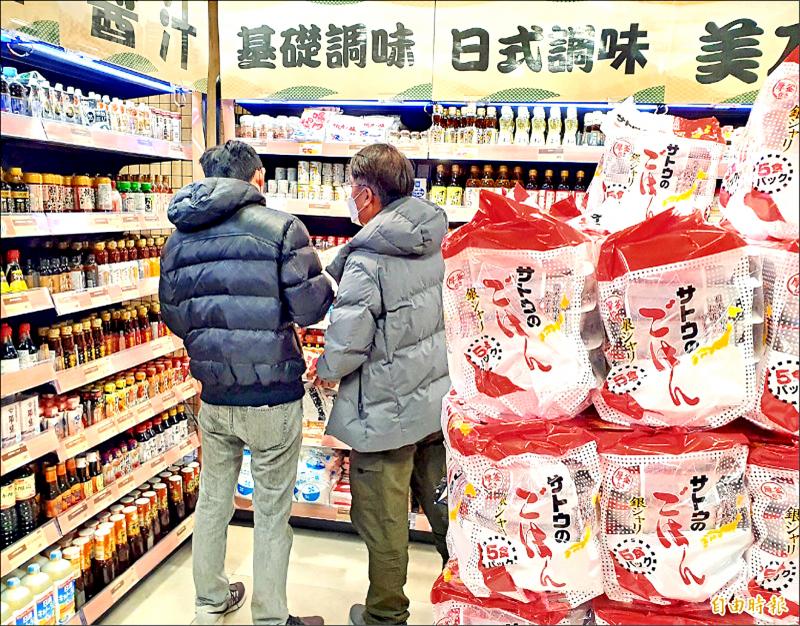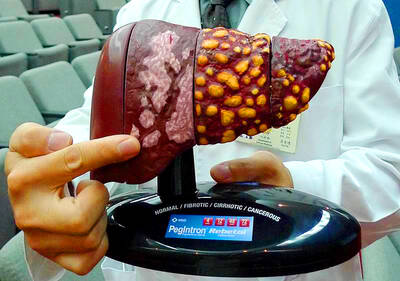The Chinese Nationalist Party (KMT) yesterday criticized the government’s plan to lift a ban on most food imports from Japan’s Fukushima Prefecture and surrounding areas, saying that the proposal was “full of rough edges” and could not guarantee children’s health.
The government announced the plan on Tuesday.
KMT Chairman Eric Chu (朱立倫) on Wednesday called for amendments to the School Health Act (學校衛生法) to ensure students’ health, but his statement was dismissed by the governing Democratic Progressive Party (DPP) caucus yesterday as “clueless,” saying that the act already stipulates that “priority be given to local produce.”

Photo: Lin Hui-chin, Taipei Times
“The DPP is the one being clueless, defending the wrong policy by distorting facts,” KMT spokeswoman Chiang I-chen (江怡臻) said yesterday.
Article 23 of the act states that local produce should be prioritized, not that it should be the only source, providing a loophole to allow schools to use produce from Fukushima, Chiang said, adding that Council of Agriculture Minister Chen Chi-chung (陳吉仲) has said that school lunches nationwide use 7 percent of non-Taiwanese produce.
The DPP has “resorted to slander in its haste to support its policy, which is unacceptable,” Chiang said.
The decision to lift the ban on Fukushima imports without public consultation was “hasty” and “goes against everything the DPP stands for,” she said, adding that the KMT is siding with the people and focusing its efforts on food safety.
The KMT has “zero tolerance” for lapses in food security, especially regarding children, and would apply strict standards to prevent schools from serving food imported from Fukushima, she said.
Separately yesterday, New Taipei City Mayor Hou You-yi (侯友宜) of the KMT said that no Fukushima food imports would be allowed in schools in New Taipei City if there is any doubt about its safety.
“Schools will not use any food imported from the region if children’s health cannot be guaranteed,” Hou said.

The Taipei Summer Festival is to begin tomorrow at Dadaocheng Wharf (大稻埕), featuring four themed firework shows and five live music performances throughout the month, the Taipei Department of Information and Tourism said today. The festival in the city’s Datong District (大同) is to run until Aug. 30, holding firework displays on Wednesdays and the final Saturday of the event. The first show is scheduled for tomorrow, followed by Aug. 13, 20 and 30. To celebrate the 30th anniversary of Disney Pixar's movie Toy Story, the festival has partnered with Walt Disney Co (Taiwan) to host a special themed area on

Aftershocks from a magnitude 6.2 earthquake that struck off Yilan County at 3:45pm yesterday could reach a magnitude of 5 to 5.5, the Central Weather Administration (CWA) said. Seismological Center technical officer Chiu Chun-ta (邱俊達) told a news conference that the epicenter of the temblor was more than 100km from Taiwan. Although predicted to measure between magnitude 5 and 5.5, the aftershocks would reach an intensity of 1 on Taiwan’s 7-tier scale, which gauges the actual effect of an earthquake, he said. The earthquake lasted longer in Taipei because the city is in a basin, he said. The quake’s epicenter was about 128.9km east-southeast

BE CAREFUL: The virus rarely causes severe illness or death, but newborns, older people and those with medical conditions are at risk of more severe illness As more than 7,000 cases of chikungunya fever have been reported in China’s Guangdong Province this year, including 2,892 new cases last week, the Centers for Disease Control (CDC) yesterday said it is monitoring the situation and considering raising the travel notice level, which might be announced today. The CDC issued a level 1 travel notice, or “watch,” for Guangdong Province on July 22, citing an outbreak in Foshan, a manufacturing hub in the south of the province, that was reported early last month. Between July 27 and Saturday, the province reported 2,892 new cases of chikungunya, reaching a total of 7,716

STAY VIGILANT: People should reduce the risk of chronic liver inflammation by avoiding excessive alcohol consumption, smoking and eating pickled foods, the physician said A doctor last week urged people to look for five key warning signs of acute liver failure after popular producer-turned-entertainer Shen Yu-lin (沈玉琳) was reportedly admitted to an intensive care unit for fulminant hepatitis. Fulminant hepatitis is the rapid and massive death of liver cells, impairing the organ’s detoxification, metabolic, protein synthesis and bile production functions, which if left untreated has a mortality rate as high as 80 percent, according to the Web site of Advancing Clinical Treatment of Liver Disease, an international organization focused on liver disease prevention and treatment. People with hepatitis B or C are at higher risk of